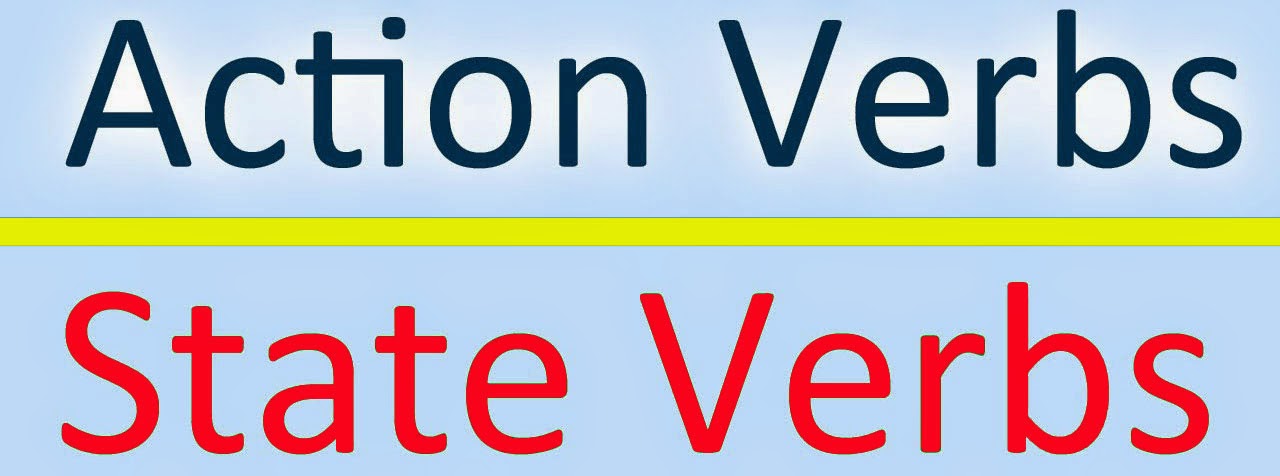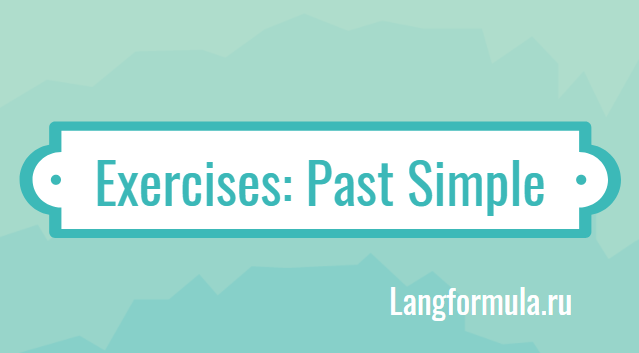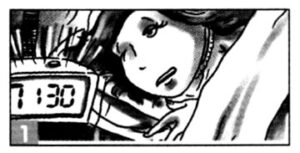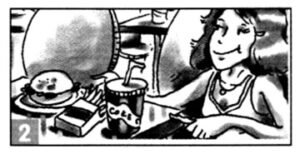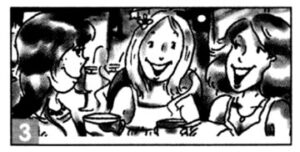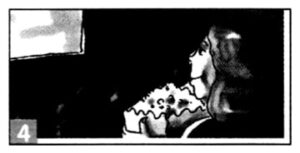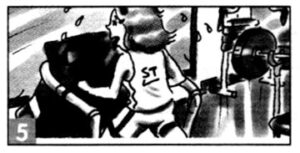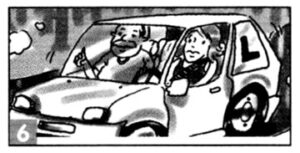1. Найдите в следующем списке глаголов только глаголы состояния.
to love, to understand, to cost, to work, to need, to enjoy, to learn, to want, to hate, to like, to sleep, to believe, to agree, to answer, to translate, to prefer, to drive, to remember, to belong, to matter, to depend, to drink, to paint, to sing, to seem, to know, to leave, to own, to fall, to adore, to cry, to allow, to doubt, to plant, to travel, to promise.
2. Выберите верную форму глагола.
- He … (likes/is liking) his job. (Ему нравится его работа.)
- We … (know/are knowing) you are busy today. (Мы знаем, что ты занят сегодня.)
- I … (have/am having) French lessons on Tuesdays. (У меня уроки французского по вторникам.)
- Caroline … (has/is having) lunch at the moment. (В данный момент Каролина обедает.)
- My parents … (have/are having) a nice garden in the country. (У моих родителей есть хороший сад в деревне.)
- I … (need/am needing) some more time. (Мне нужно еще немного времени.)
- … (Do you realize/Are you realizing) what time it is? (Вы осознаете, который сейчас час?)
- I am sorry but I … (don’t understand/am not understanding). (Простите, но я не понимаю.)
- She … (thinks/is thinking) about travelling to Spain. (Она подумывает о путешествии в Испанию.)
- We … (think/are thinking) your house is wonderful. (Мы считаем ваш дом прекрасным.)
- Why … (do you taste/are you tasting) the salad? Is it fresh? (Почему вы пробуете салат? Он свежий?)
- … (Do they agree/Are they agreeing) with my answer? (Они согласны с моим ответом?)
- The luggage … (contains/is containing) clothes only. (Багаж состоит лишь из одежды.)
- … (Do you believe/Are you believing) in god? (Вы верите в бога?)
- I … (see/am seeing) an elegant woman across the street. (Я вижу элегантную женщину по ту сторону дороги.)
3. Найдите ошибки в форме глаголов (если они имеются) и исправьте их.
- Yes, I am understanding what you mean.
- I am not liking chocolate ice-cream.
- Sandra is having a serious talk with her father now.
- I’m OK and I don’t need an ambulance.
- My mum is adoring white roses.
- They have a big house in the suburbs of Madrid.
- Tom is preferring racing cars to motorbikes.
- Are you hearing some noise in the kitchen?
- I am thinking about finding a new job.
- The kids aren’t wanting any more biscuits.
- Why aren’t you agreeing with me?
- He is not knowing my name.
- That laptop belongs to me.
- I’m not enjoying this party. The music is too loud.
- How much is this perfume costing?
Ответы:
1.
to love (любить), to understand (понимать), to cost (стоить), to need (нуждаться), to enjoy (наслаждаться), to want (хотеть), to hate (ненавидеть), to like (нравиться), to believe (верить, полагать), to agree (соглашаться), to prefer (предпочитать), to remember (помнить), to belong (принадлежать), to matter (иметь значение), to depend (зависеть), to seem (казаться), to know (знать), to own (владеть), to adore (обожать), to allow (позволять), to doubt (сомневаться), to promise (обещать).
2.
- likes
- know
- have
- is having
- have
- need
- Do you realize
- don’t understand
- is thinking
- think
- are you tasting
- Do they agree
- contains
- Do you believe
- see
3.
- Yes, I understand what you mean. (Да, я понимаю, что вы имеете ввиду.)
- I don’t like chocolate ice-cream. (Я не люблю шоколадное мороженое.)
- + (У Сандры сейчас серьезный разговор с ее отцом.)
- + (Я в порядке, и мне не нужна скорая помощь.)
- My mum adores white roses. (Моя мама обожает белые розы.)
- + (У них есть большой дом в пригороде Мадрида.)
- Tom prefers racing cars to motorbikes. (Том предпочитает гоночные машины мотоциклам.)
- Do you hear some noise in the kitchen? (Ты слышишь какой-то шум в кухне?)
- + (Я подумываю о том, чтобы найти новую работу.)
- The kids don’t want any more biscuits. (Дети больше не хотят печенья.)
- Why don’t you agree with me? (Почему ты со мной не согласен?)
- He doesn’t know my name. (Он не знает моего имени.)
- + (Этот ноутбук принадлежит мне.)
- + (Мне не нравится эта вечеринка. Музыка слишком громкая.)
- How much does this perfume cost? (Сколько стоят эти духи?)
Упражнения «Английские глаголы состояния и действия State verbs/action verbs» (с ответами) — 4.7 out of
5
based on
28 votes
Содержание
- GRAMMAR ERROR cORRECTION PAST SIMPLE Positives, Negatives and Questions Find and correct the mistokes below. ate 1. They eat dinner at six o’clock yesterday. They ate 2. Did Maria drove to work this morning? 3. I not finished my homework last night. 4. Did you busy last Monday? 5. Was she buy a new car yesterday? 6. I wanted to went to Montreal two years ago. 7. Was you late for the meeting? 8. Who did you talked to? 9. Where was you stay in Washington? 10. I was read that book last year. 11. John flied to Argentina last week. 12. He weren’t at home last night. 13. I not see the movie last weekend ? 14. What do you did last night? 15. Did they has a good time at the party? 16. Did you in class yesterday?
- Grammar error correction past simple ответы
- Grammar error correction past simple ответы
- Тест для 5 класса по теме Past-simple-error-correction-
- Особенности подготовки к проведению ВПР в рамках мониторинга качества образования обучающихся по учебному предмету «Английский язык» в условиях реализации ФГОС ООО
- Профессиональные компетенции педагога в рамках Федерального закона «Об образовании в Российской Федерации» №273-ФЗ от 29.12.2012
- Немецкий язык: теория и методика преподавания в профессиональном образовании
- Методика обучения физической культуре в системе высшего профессионального физкультурного образования
- Дистанционные курсы для педагогов
- Найдите материал к любому уроку, указав свой предмет (категорию), класс, учебник и тему:
- Другие материалы
- Вам будут интересны эти курсы:
- Оставьте свой комментарий
- Автор материала
- Дистанционные курсы для педагогов
- Подарочные сертификаты
- Упражнения на Past Simple с ответами и переводом
- Упражнение 1: Past Simple в утвердительной и отрицательной форме
- Упражнение 2: Past Simple в вопросительных предложениях
- Упражнение 3: Past Simple в утвердительных, отрицательных и вопросительных предложениях
- Упражнение 4: Найдите ошибки в тексте
GRAMMAR ERROR cORRECTION PAST SIMPLE
Positives, Negatives and Questions
Find and correct the mistokes below.
ate
1. They eat dinner at six o’clock yesterday.
They ate
2. Did Maria drove to work this morning?
3. I not finished my homework last night.
4. Did you busy last Monday?
5. Was she buy a new car yesterday?
6. I wanted to went to Montreal two years ago.
7. Was you late for the meeting?
8. Who did you talked to?
9. Where was you stay in Washington?
10. I was read that book last year.
11. John flied to Argentina last week.
12. He weren’t at home last night.
13. I not see the movie last weekend ?
14. What do you did last night?
15. Did they has a good time at the party?
16. Did you in class yesterday?
Jawaban:
- ate
- drive
- did not
- were you busy
- did she
- I wanted to go
- were you
- talk
- where did
- I read that book last year (read bentuj keduanya sama read juga)
- flew (bukan flied)
- he wasn’t
- ? did i not see the movue last weekend?
- what did you do last night?
- did they have
- were you
Источник
Grammar error correction past simple ответы
Error Correction Exercise
There are fifteen grammatical errors in this passage. Make corrections to each error.
David Clark, 25, is living most of the time in York with his parents, but he is also the world’s first mountaineering garbage collector. He has already been making two trips to the Mount Everest to pick up trash left by expeditions there, and now he is aiming to be youngest person to climb the world’s highest mountain.
It was while he was working in the climbing equipment shop that he was hearing about the trash left on Everest. He was looking for something very challenging to do and he was liking the idea of being a garbage collector with a difference.
He is amazed at how many junk he has found. At 17,000 feet he was coming across cornflakes packets, several of empty caviar cans, and hundreds of the hypodermic needles and syringes. So far he has been collecting enough trash to cover three football fields.
For the last six months David has prepared to climb to the summit of Everest. He is training hard in the Himalayas and has been being on a strict diet. If he succeeds, he will be the youngest British person ever to reach a top of Everest.
Notes and Discussion of Answers
There are fifteen grammatical errors in this passage. Make corrections to each error.
David Clark, 25, is living lives [ 1; review present simple v. present continuous] most of the time in York with his parents, but he is also the world’s first mountaineering garbage collector. He has already been making has already made [ 2; review present perfect] two trips to the [ 3; review zero article] Mount Everest to pick up trash left by expeditions there, and now he is aiming to be the [ 4; review definite article] youngest person to climb the world’s highest mountain.
It was while he was working in the a [ 5; review definite article] climbing equipment shop that he was hearing heard [ 6; review past simple v. past continuous] about the trash left on Everest. He was looking for something very challenging to do and he was liking liked [ 7; review state or stative verbs] the idea of being a garbage collector with a difference.
He is amazed at how many much [ 8; review quantifiers] junk he has found. At 17,000 feet he was coming came [ 9; review past simple v. past continuous] across cornflakes packets, several of [ 10; review quantifiers] empty caviar cans, and hundreds of the [ 11; review definite article] hypodermic needles and syringes. So far he has been collecting collected [ 12; review perfect aspect] enough trash to cover three football fields.
For the last six months David has prepared been preparing [ 13; review present perfect continuous] to climb to the summit of Everest. He is training hard in the Himalayas and has been being [ 14; review present perfect] on a strict diet. If he succeeds, he will be the youngest British person ever to reach a the [ 15; review definite article] top of Everest.
Источник
Grammar error correction past simple ответы
Error Correction Exercise
There are fifteen grammatical errors in this passage. Make corrections to each error.
David Clark, 25, is living most of the time in York with his parents, but he is also the world’s first mountaineering garbage collector. He has already been making two trips to the Mount Everest to pick up trash left by expeditions there, and now he is aiming to be youngest person to climb the world’s highest mountain.
It was while he was working in the climbing equipment shop that he was hearing about the trash left on Everest. He was looking for something very challenging to do and he was liking the idea of being a garbage collector with a difference.
He is amazed at how many junk he has found. At 17,000 feet he was coming across cornflakes packets, several of empty caviar cans, and hundreds of the hypodermic needles and syringes. So far he has been collecting enough trash to cover three football fields.
For the last six months David has prepared to climb to the summit of Everest. He is training hard in the Himalayas and has been being on a strict diet. If he succeeds, he will be the youngest British person ever to reach a top of Everest.
Notes and Discussion of Answers
There are fifteen grammatical errors in this passage. Make corrections to each error.
David Clark, 25, is living lives [ 1; review present simple v. present continuous] most of the time in York with his parents, but he is also the world’s first mountaineering garbage collector. He has already been making has already made [ 2; review present perfect] two trips to the [ 3; review zero article] Mount Everest to pick up trash left by expeditions there, and now he is aiming to be the [ 4; review definite article] youngest person to climb the world’s highest mountain.
It was while he was working in the a [ 5; review definite article] climbing equipment shop that he was hearing heard [ 6; review past simple v. past continuous] about the trash left on Everest. He was looking for something very challenging to do and he was liking liked [ 7; review state or stative verbs] the idea of being a garbage collector with a difference.
He is amazed at how many much [ 8; review quantifiers] junk he has found. At 17,000 feet he was coming came [ 9; review past simple v. past continuous] across cornflakes packets, several of [ 10; review quantifiers] empty caviar cans, and hundreds of the [ 11; review definite article] hypodermic needles and syringes. So far he has been collecting collected [ 12; review perfect aspect] enough trash to cover three football fields.
For the last six months David has prepared been preparing [ 13; review present perfect continuous] to climb to the summit of Everest. He is training hard in the Himalayas and has been being [ 14; review present perfect] on a strict diet. If he succeeds, he will be the youngest British person ever to reach a the [ 15; review definite article] top of Everest.
Источник
Тест для 5 класса по теме Past-simple-error-correction-

Курс повышения квалификации
Особенности подготовки к проведению ВПР в рамках мониторинга качества образования обучающихся по учебному предмету «Английский язык» в условиях реализации ФГОС ООО
- Сейчас обучается 135 человек из 45 регионов

Курс повышения квалификации
Профессиональные компетенции педагога в рамках Федерального закона «Об образовании в Российской Федерации» №273-ФЗ от 29.12.2012
- Сейчас обучается 64 человека из 28 регионов

Курс профессиональной переподготовки
Немецкий язык: теория и методика преподавания в профессиональном образовании

Методика обучения физической культуре в системе высшего профессионального физкультурного образования
Акция до 15 января
- Опытные онлайн-репетиторы
- Подготовка к ЕГЭ и ОГЭ
- По всем школьным предметам 1-11 класс
Дистанционные курсы для педагогов
Видеолекции для
профессионалов
- Свидетельства для портфолио
- Вечный доступ за 120 рублей
- 2 200+ видеолекции для каждого
Найдите материал к любому уроку, указав свой предмет (категорию), класс, учебник и тему:
6 065 573 материала в базе
Другие материалы
Вам будут интересны эти курсы:
Оставьте свой комментарий
Авторизуйтесь, чтобы задавать вопросы.
Добавить в избранное
- 30.05.2018 268
- DOCX 237.9 кбайт
- Оцените материал:
Настоящий материал опубликован пользователем Осипова Ирина Владимировна. Инфоурок является информационным посредником и предоставляет пользователям возможность размещать на сайте методические материалы. Всю ответственность за опубликованные материалы, содержащиеся в них сведения, а также за соблюдение авторских прав несут пользователи, загрузившие материал на сайт
Если Вы считаете, что материал нарушает авторские права либо по каким-то другим причинам должен быть удален с сайта, Вы можете оставить жалобу на материал.
Автор материала
- На сайте: 6 лет и 3 месяца
- Подписчики: 0
- Всего просмотров: 105332
- Всего материалов: 150
Московский институт профессиональной
переподготовки и повышения
квалификации педагогов
Дистанционные курсы
для педагогов
663 курса от 490 рублей
Выбрать курс со скидкой
Выдаём документы
установленного образца!
Учитесь с проверенными репетиторами
Общие и отличительные черты учебно-исследовательской и проектной деятельности
Управление бережливой производственной линией
Методика воспитания гибкости у детей дошкольного возраста
Подарочные сертификаты
Ответственность за разрешение любых спорных моментов, касающихся самих материалов и их содержания, берут на себя пользователи, разместившие материал на сайте. Однако администрация сайта готова оказать всяческую поддержку в решении любых вопросов, связанных с работой и содержанием сайта. Если Вы заметили, что на данном сайте незаконно используются материалы, сообщите об этом администрации сайта через форму обратной связи.
Все материалы, размещенные на сайте, созданы авторами сайта либо размещены пользователями сайта и представлены на сайте исключительно для ознакомления. Авторские права на материалы принадлежат их законным авторам. Частичное или полное копирование материалов сайта без письменного разрешения администрации сайта запрещено! Мнение администрации может не совпадать с точкой зрения авторов.
Источник
Упражнения на Past Simple с ответами и переводом
Пройдите упражнения на Past Simple, чтобы лучше запомнить, как употребляются глаголы в этом времени. Если вы не знакомы с этой темой, рекомендую сначала прочитать статью: «Past Simple — простое прошедшее время в английском языке».
Упражнение 1: Past Simple в утвердительной и отрицательной форме
Пройдите эти упражнения, чтобы лучше запомнить, как образуются утвердительная и отрицательная формы Past Simple. Обратите внимание, нужно правильно использовать глагол to do и неправильные глаголы.
- We played chess with Tomas yesterday. – Мы играли в шахматы с Томом вчера.
- Natalie stayed at the hotel. – Натали остановилась в отеле.
- She did not know my address. – Она не знала мой адрес.
- They saw something interesting. – Они видели что-то интересное.
- I did not understand those words. – Я не понимал тех слов.
- You heard the order. – Вы слышали приказ.
- Our parents did not trust – Наши родители не доверяли врачам.
- Helen had an idea. – У Хелен была идея.
- He did not feel any difference. – Он не почувствовал никакой разницы.
- I knew it! – Я знал это!
Упражнение 2: Past Simple в вопросительных предложениях
Это задание намного проще предыдущего, потому что в вопросах в Present Simple неправильные глаголы не играют никакой роли. Главное — не перепутать, какой нужен вспомогательный глагол.
- Did she ask any questions? – Она задавала какие-нибудь вопросы?
- Did you see them running? – Вы видели, как они бежали?
- Did Alice come back home? – Алиса вернулась домой?
- Did they notice anything? – Они что-нибудь заметили?
- When did Sandy buy this necklace? – Когда Салли купила это ожерелье?
- How much did you pay for water? – Сколько вы заплатили за воду?
- What did you find on the ground? – Что ты нашел на земле?
- Why did you cry? – Почему вы плакали?
Упражнение 3: Past Simple в утвердительных, отрицательных и вопросительных предложениях
В этом упражнении нужно правильно использовать Past Simple в трех видах предложений.
Пройдите тест на уровень английского:
- I made a mistake. – Я совершил ошибку.
- We broke the rules. – Мы нарушили правила.
- Denise shared her Birthday photos. – Дениз выложила (поделилась) свои фото с Дня рожденья.
- People did not like the stranger. – Людям не нравился чужеземец.
- Did I say anything wrong? – Я что-то не так сказал?
- Did your aunt watch that movie yesterday? – Твоя тетя вчера смотрела этот фильм?
- You did not promise Danny to help. – Ты не обещал Денни помочь.
- She cut a sheet of paper. – Она разрезала лист бумаги.
Упражнение 4: Найдите ошибки в тексте
Прочитайте короткий и простой текст, в котором допущено несколько грубых ошибок. Сможете ли вы их найти?
| Rick didn’t wake up on the next day. | Рик не проснулся на следующий день. |
| He slept all week. | Он спал всю неделю. |
| When he woke up there was no one around. | Когда он проснулся, вокруг никого не было. |
| He came out of his room and went outside. | Он вышел из комнаты и пошел на улицу. |
| The street looked empty. | Улица выглядела пустой. |
| ‘What happened?’ | «Что произошло?» — |
| He asked himself. | Спросил он себя. |
| ‘Where did everyone go?’ | «Куда все ушли?» |
| Then he noticed someone around the corner. | Затем он заметил кого-то за углом. |
| A woman lay on the ground. | Женщина лежала на земле. |
| She didn’t look alive. | Она не выглядела живой. |
| But then she moved. | Но затем она шевельнулась. |
Если вы обнаружили ошибку, неточность или правильный ответ засчитывается как неправильный, пожалуйста, напишите в комментариях. Если у вас есть вопросы по заданиям, тоже напишите в комментариях 🙂

Источник
A. Look at the pictures of Helen and use the prompts to write sentences. Use the correct form of the present simple.
every day / get up / at half past seven
often / eat fast food for lunch
in the evening / usually / meet her friends for coffee
once a week / watch a film at the cinema
rarely / go to the gym
have a driving lesson / twice a week
1 ……………………………………………….
2 ……………………………………………….
3 ……………………………………………….
4 ……………………………………………….
5 ……………………………………………….
6 ……………………………………………….
Answer
1 Every day, Helen gets up at half past seven.
2 Helen often eats fast food for lunch.
3 In the evening, Helen usually meets her friends for coffee.
4 Once a week, Helen watches a film at the cinema.
5 Helen rarely goes to the gym.
6 Helen has a driving lesson twice a week.
B. Complete using the correct present continuous form of the verbs in brackets. You may have to use some negative forms.
1 Gordon? I think he ……………………… (write) a letter at the moment.
2 Yes, the match is on T now, but we ……………………… (lose).
3 Right now, Margaret ……………………… (have) a shower. Do you want to ring later?
4 Sally ……………………… (stay) with her aunt for a few days.
5 I ……………………… (lie)! It’s true! I did see Madonna at the supermarket.
6 Josh ……………………… (always / use) my bike! It’s so annoying.
7 We ……………………… (have) lunch, but I can come round and help you later.
8 ……………………… (you / play) music up there? It’s really noisy!
Answer
1 is writing 2 are losing
3 is having 4 is staying
5 am not lying 6 is always using
7 are having 8 Are you playing
C. Rewrite correctly. Change the words or phrases in bold.
1 Are top musicians studying for many years? ……………………………..
2 What’s going on? I hope you don’t touch my things! ……………………………..
3 It’s a small business, so each person is doing lots of different jobs. ……………………………..
4 Does Christine listen to the radio, or is that the T I can hear? ……………………………..
5 I am usually buying a special ticket each week for the bus because it’s cheaper. ……………………………..
6 Our washing machine is starting when you press this button. ……………………………..
7 How’s the match going? Does our team win? ……………………………..
8 Many people are enjoying spending time on the beach on holiday. ……………………………..
Answer
1 Do top musicians study
2 aren’t touching 3 does
4 Is Christine listening
5 usually buy 6 starts
7 Is our team winning?
8 enjoy
D. Circle the correct word or phrase.
1 I work / am working at the local library for the summer.
2 We don’t go / aren’t going to the theatre very often.
3 Stacy gets / is getting ready for school, so she can’t come to the phone.
4 Does Gary ever talk / Is Gary ever talking about his expedition to the Amazon jungle?
5 In squash, you hit / are hitting a ball against a wall.
6 I read / am reading a newspaper at least once a week.
7 Do you practise / Are you practising the piano for two hours every day?
8 Nadine and Claire do / are doing quite well at school at the moment.
9 A good friend knows / is knowing when you’re upset about something.
10 How do you spell / are you spelling your name?
Answer
1 am working 2 don’t go
3 is getting 4 Does Gary ever talk
5 hit 6 read
7 Do you practise 8 are doing
9 knows 10 do you spell
E. Complete using the correct present simple or present continuous form of the verbs in the box. You may have to use some negative forms.
belong • do • have • help • hold • move • use • watch
1 In Monopoly, you …………………… around the board, buying houses and hotels.
2 …………………… you …………………… this programme or can I turn the TV off?
3 Regular exercise …………………… you to stay healthy.
4 I …………………… my brother’s guitar until I get a new one.
5 …………………… Simon always …………………… the washing-up after lunch?
6 …………………… you …………………… any sweaters in a larger size?
7 You …………………… the kite right. Let me show you.
8 Dad …………………… to the local astronomy club.
Answer
1 move 2 Are/watching
3 helps 4 am using
5 Does/do 6 Do/have
7 aren’t holding 8 belongs
F. Underline ten verbs in the wrong tense and rewrite them correctly.
‘One game I am loving is backgammon. You are throwing the dice and then you move your pieces around the board. It is seeming quite easy, but in fact you are needing to be quite careful. When your piece lands on one of the other person’s pieces, you are taking it off the board and you send it back to the beginning. You are winning by getting all your pieces to the end and off the board. Some people are preferring chess, but I am not understanding that game. Right now, I wait to have a game with my brother. He does his homework. I usually win, so I think he doesn’t want to play a game with me!’
1 ……………………………
2 ……………………………
3 ……………………………
4 ……………………………
5 ……………………………
6 ……………………………
7 ……………………………
8 ……………………………
9 ……………………………
10 ……………………………
Answer
1 am loving/love
2 are throwing/throw
3 is seeming/seems
4 are needing/need
5 are talking/take
6 are winning/win
7 are preferring/prefer
8 am not understanding/don’t understand
9 wait/am waiting
10 does/is doing
Related Posts
- English Grammar Exercises for B1 B2 – Linking words 2: reason, purpose and result
- English Grammar Exercises for B1 B2 – Linking words 1
- English Grammar Exercises for B1 B2 – It and there
- English Grammar Exercises for B1 B2 – Word formation 2: nouns (affixes)
- English Grammar Exercises for B1 B2 – Word formation 1: verbs and adjectives (affixes)
- English Grammar Exercises for B1 B2 – Non-defining relative clauses

